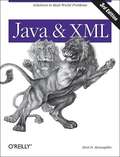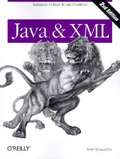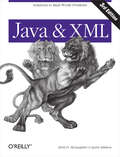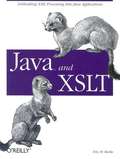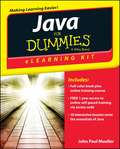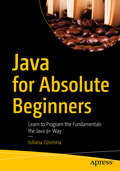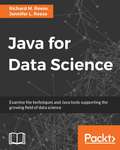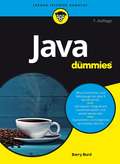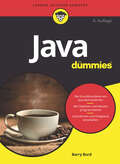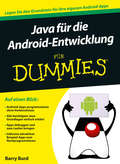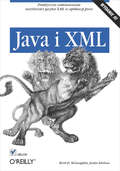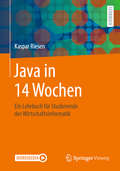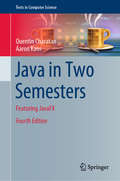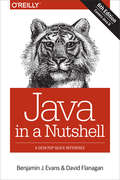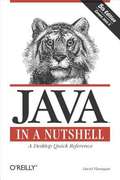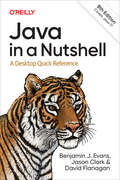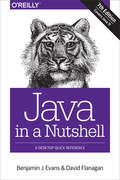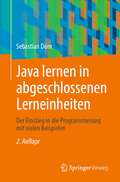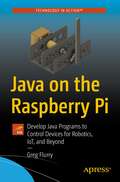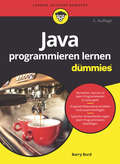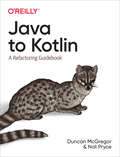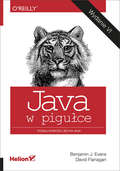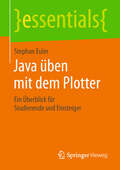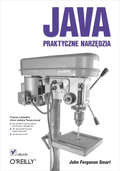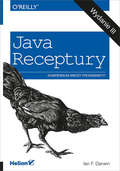- Table View
- List View
Java and XML
by Brett MclaughlinThorough knowledge of both Java and XML is indispensable if developers want to build modern web applications. Because both languages are platform independent, they are ubiquitous in the world of web development, and the combination of the two allows enterprises to lower the costs of information sharing for e-commerce and other high-octane web applications and services. Our third edition of Java and XML is ideal for any Java developer who wants to take advantage of XML without having to become an expert on the markup language. So, unlike other XML titles, this book is written from a Java developer's point of view, and assumes no prior knowledge of XML. The new edition has been thoroughly revised with coverage of Java 5.0 as well as new standards for SOAP, a key web services technology that works with XML and provides a central part of Microsoft's .NET platform.
Java and XML, 2nd Edition
by Brett MclaughlinWhile the XML "buzz" still dominates talk among Internet developers, the critical need is for information that cuts through the hype and lets Java programmers put XML to work. Java and XML shows how to use the APIs, tools, and tricks of XML to build real-world applications, with the end result that both the data and the code are portable. This second edition of Java & XML adds chapters on Advanced SAX and Advanced DOM, new chapters on SOAP and data binding, and new examples throughout. A concise chapter on XML basics introduces concepts, and the rest of the book focuses on using XML from your Java applications. Java developers who need to work with XML, or think that they will in the future--as well as developers involved in the new peer-to-peer movement, messaging, or web services--will find the new Java and XML a constant companion. This book covers: The basics of XML, including DTDs, namespaces, XML Schema, XPath, and XSL The SAX API, including all handlers, the SAX 2 extensions, filters, and writers The DOM API, including DOM Level 2, Level 3, and the Traversal, Range, CSS, Events, and HTML modules. The JDOM API, including the core, a look at XPath support, and JDOM as a JSR Using web publishing frameworks like Apache Cocoon Developing applications with XML-RPC Using SOAP and UDDI for web services Data Binding, using both DTDs and XML Schema for constraints Building business-to-business applications with XML Building information channels with RSS and dynamic content with XSP Includes a quick reference on SAX 2.0, DOM Level 2, and JDOM.
Java and XML: Solutions to Real-World Problems
by Justin Edelson Brett McLaughlinJava and XML, 3rd Edition, shows you how to cut through all the hype about XML and put it to work. It teaches you how to use the APIs, tools, and tricks of XML to build real-world applications. The result is a new approach to managing information that touches everything from configuration files to web sites. After two chapters on XML basics, including XPath, XSL, DTDs, and XML Schema, the rest of the book focuses on using XML from your Java applications. This third edition of Java and XML covers all major Java XML processing libraries, including full coverage of the SAX, DOM, StAX, JDOM, and dom4j APIs as well as the latest version of the Java API for XML Processing (JAXP) and Java Architecture for XML Binding (JAXB). The chapters on web technology have been entirely rewritten to focus on the today's most relevant topics: syndicating content with RSS and creating Web 2.0 applications. You'll learn how to create, read, and modify RSS feeds for syndicated content and use XML to power the next generation of websites with Ajax and Adobe Flash. Topics include:The basics of XML, including DTDs, namespaces, XML Schema, XPath, and TransformationsThe SAX API, including all handlers, filters, and writersThe DOM API, including DOM Level 2, Level 3, and the DOM HTML moduleThe JDOM API, including the core and a look at XPath supportThe StAX API, including StAX factories, producing documents and XMLPullData Binding with JAXB, using the new JAXB 2.0 annotationsWeb syndication and podcasting with RSSXML on the Presentation Layer, paying attention to Ajax and Flash applications If you are developing with Java and need to use XML, or think that you will be in the future; if you're involved in the new peer-to-peer movement, messaging, or web services; or if you're developing software for electronic commerce, Java and XML will be an indispensable companion.
Java and XSLT
by Eric M. BurkeThe power of XSLT is its ability to change the structure or format of any content that can be converted to XML. Java and XSLT shows you how to use XSL transformations in Java programs ranging from stand-alone applications to servlets. After an introduction to XSLT, the book focuses on applying transformations in some real-world scenarios, such as developing a discussion forum, transforming documents from one form to another, and generating content for wireless devices. Java and XSLT discusses several common XSLT processors and the TRAX API, paying special attention to performance issues. Although there's a brief tutorial introduction to the XSLT language, the primary focus of the book isn't on learning XSLT or developing stylesheets; it's on making practical use of transformations in Java code. The book covers: Introduction and Technology Review XSLT--The Basics XSLT--Beyond The Basics Java Web Architecture Programmatic Interfaces to XSLT Processors Using XSLT with Servlets Discussion Forum Implementation Advanced XSLT Web Techniques Testing, Tuning and Development Environments WAP and WML XSLT and Wireless Examples
Java eLearning Kit For Dummies
by John Paul MuellerA complete book-and-online course package for learning Java!As a platform-independent, object-oriented programming language, Java helps developers write once and run anywhere. With this dynamic combination of a full-color printed book and a Dummies online interactive eLearning course, you'll find a wealth of information on the latest release of Java. Featuring both written and animated step-by-step how-tos, practice labs, helpful videos, numerous examples, and a host of Dummies hints and tips, this package makes your learning process easier.Follow the material sequentially or jump in and out as you wish--it's set up so you can learn at your own pace. Throughout, you will benefit from illustrations, animations, voiceover explanations, and the option of closed captioning if you find you learn better when you can read the instructions.Helps self-motivated learners master Java, the leading object-oriented programming languageIncludes an easy-to-follow, full-color book and an online interactive Dummies eLearning Course that corresponds with the book available via access codeAllows you to follow the material sequentially or choose separate sections at your own time and paceOffers chapter summaries, practice exercises, discussions of concepts and essential terms, and much moreJava eLearning Kit For Dummies helps you maximize the potential of this dynamic programming language so you can work more efficiently.
Java for Absolute Beginners: Learn to Program the Fundamentals the Java 9+ Way
by Iuliana CosminaWrite your first code in Java using simple, step-by-step examples that model real-word objects and events, making learning easy. With this book you’ll be able to pick up the concepts without fuss. Java for Absolute Beginners teaches Java development in language anyone can understand, giving you the best possible start. You’ll see clear code descriptions and layout so that you can get your code running as soon as possible. After reading this book, you'll come away with the basics to get started writing programs in Java.Author Iuliana Cosmina focuses on practical knowledge and getting up to speed quickly—all the bits and pieces a novice needs to get started programming in Java. First, you’ll discover how Java is executed, what type of language it is, and what it is good for. With the theory out of the way, you’ll install Java, choose an editor such as IntelliJ IDEA, and write your first simple Java program. Along the way you’ll compile and execute this program so it can run on any platform that supports Java. As part of this tutorial you’ll see how to write high-quality code by following conventions and respecting well-known programming principles, making your projects more professional and efficient.Finally, alongside the core features of Java, you’ll learn skills in some of the newest and most exciting features of the language: Generics, Lambda expressions, modular organization, local-variable type inference, and local variable syntax for Lambda expressions.Java for Absolute Beginners gives you all you need to start your Java 9+ programming journey. No experience necessary. What You'll LearnUse data types, operators, and the new stream APIInstall and use a build tool such as GradleBuild interactive Java applications with JavaFX Exchange data using the new JSON APIs Play with images using multi-resolution APIsUse the publish-subscribe frameworkWho This Book Is ForThose who are new to programming and who want to start with Java.
Java for Data Science
by Richard M. Reese Jennifer L. ReeseExamine the techniques and Java tools supporting the growing field of data science About This Book • Your entry ticket to the world of data science with the stability and power of Java • Explore, analyse, and visualize your data effectively using easy-to-follow examples • Make your Java applications more capable using machine learning Who This Book Is For This book is for Java developers who are comfortable developing applications in Java. Those who now want to enter the world of data science or wish to build intelligent applications will find this book ideal. Aspiring data scientists will also find this book very helpful. What You Will Learn • Understand the nature and key concepts used in the field of data science • Grasp how data is collected, cleaned, and processed • Become comfortable with key data analysis techniques • See specialized analysis techniques centered on machine learning • Master the effective visualization of your data • Work with the Java APIs and techniques used to perform data analysis In Detail Data science is concerned with extracting knowledge and insights from a wide variety of data sources to analyse patterns or predict future behaviour. It draws from a wide array of disciplines including statistics, computer science, mathematics, machine learning, and data mining. In this book, we cover the important data science concepts and how they are supported by Java, as well as the often statistically challenging techniques, to provide you with an understanding of their purpose and application. The book starts with an introduction of data science, followed by the basic data science tasks of data collection, data cleaning, data analysis, and data visualization. This is followed by a discussion of statistical techniques and more advanced topics including machine learning, neural networks, and deep learning. The next section examines the major categories of data analysis including text, visual, and audio data, followed by a discussion of resources that support parallel implementation. The final chapter illustrates an in-depth data science problem and provides a comprehensive, Java-based solution. Due to the nature of the topic, simple examples of techniques are presented early followed by a more detailed treatment later in the book. This permits a more natural introduction to the techniques and concepts presented in the book. Style and approach This book follows a tutorial approach, providing examples of each of the major concepts covered. With a step-by-step instructional style, this book covers various facets of data science and will get you up and running quickly.
Java für Dummies (FÜr Dummies)
by Barry BurdJava für Dummies ist gleichzeitig ein Lehrbuch und ein unverzichtbares Nachschlagewerk für alle Java-Programmierer. Basiswissen zur objektorientierten Programmierung wird genauso vermittelt wie das Prinzip der Wiederverwendbarkeit von Programmbausteinen und allgemeine Grundlagen der Java-Programmierung.
Java für Dummies (Für Dummies)
by Barry BurdSie wollen in Java einsteigen oder Ihre Kenntnisse erweitern? »Java für Dummies« ist gleichzeitig Lehrbuch und unverzichtbares Nachschlagewerk für alle Java-Programmierer. Basiswissen zur objektorientierten Programmierung wird genauso vermittelt wie das Prinzip der Wiederverwendbarkeit von Programmbausteinen. Außerdem lernen Sie, wann Variablen innerhalb oder außerhalb von Methoden deklariert werden sollten, wo die Grenzen von Arrays liegen und wie Code mit Exceptions absturzsicher gemacht wird. Diese Auflage von »Java für Dummies« berücksichtigt die Neuerungen der Version Java 17.
Java für die Android-Entwicklung für Dummies (Für Dummies)
by Barry BurdAlle Java-Grundlagen für die App-Entwicklung Sie möchten eigene Android-Apps entwickeln, können aber noch nicht programmieren oder zumindest noch kein Java? Dann ist dieses Buch wie für Sie gemacht. Nach der Installation der kostenlosen Entwicklungswerkzeuge lernen Sie Schritt für Schritt alle wichtigen Code-Elemente wie Variablen, Methoden und Schleifen sowie die objektorientierte Programmierung kennen. Außerdem erfahren Sie, wie Android-Apps aufgebaut sind, wie Sie sie mit Buttons, Auswahllisten und Layouts ausstatten und die Programmlogik mit Java erstellen. Anhand eines Spiels und einer Twitter-App sehen Sie, wie alles zusammenhängt. So steht Ihren eigenen Apps nichts mehr im Weg!
Java i XML. Wydanie III
by Brett Mclaughlin Justin EdelsonPraktyczne zastosowania mo?liwo?ci j?zyka XML w aplikacji Java Z jakich elementów sk?ada si? XML? W jaki sposób przetwarza? pliki XML w aplikacjach Javy? Jak tworzy? w?asne kana?y RSS? Jeste? programist? Javy i chcesz wykorzysta? w swoich aplikacjach technologi? XML? Zainteresowa?a Ci? technologia AJAX? Zamierzasz tworzy? w?asne kana?y RSS i podcasty? Java i XML s? niemal stworzone do wzajemnej wspó?pracy. W XML tworzy si? pliki konfiguracyjne dla aplikacji Javy, zbiory danych i wiele innych elementów. AJAX, bazuj?cy w du?ej mierze na j?zyku XML, pozwala na stworzenie eleganckich i wygodnych interfejsów u?ytkownika dla aplikacji przegl?darkowych. Wiedza o tym, jak efektywnie po??czy? XML z Jav?, pomo?e Ci w budowaniu nowoczesnych programów. "Java i XML. Wydanie III" to podr?cznik, po przeczytaniu którego staniesz si? ekspertem w zakresie wykorzystywania mo?liwo?ci j?zyka XML. Czytaj?c go, poznasz podstawy j?zyka XML, sposoby przetwarzania plików XML w aplikacjach Javy za pomoc? API SAX, DOM, StAX, JDOM i dom4j, a tak?e najnowszych wersji JAXP i JAXB. Dowiesz si?, jak tworzy? kana?y RSS, witryny Web 2.0 i w?asne podcasty. Przeczytasz tak?e o technologii AJAX i nauczysz si? budowa? z jej wykorzystaniem interfejsy u?ytkownika dla swoich aplikacji. Elementy j?zyka XML Walidacja dokumentów XML Przetwarzanie plików XML za pomoc? SAX Wykorzystanie innych technologii do obróbki plików XML Wi?zanie danych w JAXB Tworzenie kana?ów RSS Transformacja XML na HTML za pomoc? JSP Korzystanie z mechanizmów AJAX Wykorzystanie danych XML w j?zyku ActionScript 3.0 Twórz nowoczesne aplikacje, wykorzystuj?c XML
Java in 14 Wochen: Ein Lehrbuch für Studierende der Wirtschaftsinformatik
by Kaspar RiesenDieses Buch ist der ideale Begleiter, wenn Sie in einem Semester Java lernen möchten. Der Inhalt wurde gezielt ausgewählt, so dass nur die Konzepte besprochen werden, die Sie zum Einstieg in die Programmierung wirklich benötigen. Diese Konzepte werden mit zahlreichen, anschaulichen Beispielen illustriert. Weiter wird im Buch ein durchgehendes Beispielprojekt in Java, das von Kapitel zu Kapitel wächst, entwickelt. Zu jedem Kapitel finden sich zudem viele Aufgaben zur Selbstkontrolle und Programmierübungen in Java. Zu jeder Übung ist ein Lernvideo verlinkt, auf dem der Autor des Buches die Übung vorprogrammiert. Das Buch ist somit optimal geeignet für Studierende der Wirtschaftsinformatik, Informatik oder anderer Fachrichtungen sowie für alle Interessierten, die ohne Vorkenntnisse Programmieren lernen möchten.
Java in Two Semesters: Featuring JavaFX (Texts in Computer Science )
by Quentin Charatan Aaron KansThis easy-to-follow textbook teaches Java programming from first principles, as well as covering design and testing methodologies. The text is divided into two parts. Each part supports a one-semester module, the first part addressing fundamental programming concepts, and the second part building on this foundation, teaching the skills required to develop more advanced applications. <P><P> This fully updated and greatly enhanced fourth edition covers the key developments introduced in Java 8, including material on JavaFX, lambda expressions and the Stream API. <P><P> Topics and features: begins by introducing fundamental programming concepts such as declaration of variables, control structures, methods and arrays; goes on to cover the fundamental object-oriented concepts of classes and objects, inheritance and polymorphism; uses JavaFX throughout for constructing event-driven graphical interfaces; includes advanced topics such as interfaces and lambda expressions, generics, collection classes and exceptions; explains file-handling techniques, packages, multi-threaded programs, socket programming, remote database access and processing collections using streams; includes self-test questions and programming exercises at the end of each chapter, as well as two illuminating case studies; provides additional resources at its associated website (simply go to springer.com and search for "Java in Two Semesters"), including a guide on how to install and use the NetBeans™ Java IDE. Offering a gentle introduction to the field, assuming no prior knowledge of the subject, Java in Two Semesters is the ideal companion to undergraduate modules in software development or programming.
Java in a Nutshell
by David Flanagan Benjamin J EvansThe latest edition of Java in a Nutshell is designed to help experienced Java programmers get the most out of Java 7 and 8, but it's also a learning path for new developers. Chock full of examples that demonstrate how to take complete advantage of modern Java APIs and development best practices, the first section of this thoroughly updated book provides a fast-paced, no-fluff introduction to the Java programming language and the core runtime aspects of the Java platform.The second section is a reference to core concepts and APIs that shows you how to perform real programming work in the Java environment.Get up to speed on language details, including Java 8 changesLearn object-oriented programming, using basic Java syntaxExplore generics, enumerations, annotations, and lambda expressionsUnderstand basic techniques used in object-oriented designExamine concurrency and memory, and how they're intertwinedWork with Java collections and handle common data formatsDelve into Java's latest I/O APIs, including asynchronous channelsUse Nashorn to execute JavaScript on the Java Virtual MachineBecome familiar with development tools in OpenJDK
Java in a Nutshell, 5th Edition
by David FlanaganThe 1.4 release of Java 2 Standard edition brings a load of new features - and the potential for frustration. Fret not, our new 4th edition has answers. The accelerated introduction lets you start writing code right away, and because the book's classic quick reference contains all the classes in the essential Java packages, you can find exactly what you need to make Java's new version work for you.
Java in a Nutshell: A Desktop Quick Reference
by David Flanagan Benjamin J Evans Jason ClarkThis updated edition of the Nutshell guide not only helps experienced Java programmers get the most out of versions through Java 17, it also serves as a learning path for new developers. Chock-full of examples that demonstrate how to take complete advantage of modern Java APIs and development best practices, this thoroughly revised book includes new material on recent enhancements to the Java object model that every developer should know about.The first section provides a fast-paced, no-fluff introduction to the Java programming language and the core runtime aspects of the Java platform. The second section is a reference to core concepts and APIs that explains how to perform real programming work in the Java environment.Get up to speed on language details through Java 17Learn object-oriented programming using basic Java syntaxExplore generics, enumerations, annotations, and lambda expressionsUnderstand techniques used in object-oriented designExamine how concurrency and memory are intertwinedWork with Java collections and handle common data formatsDelve into Java's latest I/O APIs including asynchronous channelsBecome familiar with development tools in OpenJDK
Java in a Nutshell: A Desktop Quick Reference (Seventh Edition) (In a Nutshell)
by David Flanagan Ben Evans<p>This updated edition of Java in a Nutshell not only helps experienced Java programmers get the most out of Java versions 9 through 11, it’s also a learning path for new developers. Chock full of examples that demonstrate how to take complete advantage of modern Java APIs and development best practices, this thoroughly revised book includes new material on Java Concurrency Utilities. <p>The book’s first section provides a fast-paced, no-fluff introduction to the Java programming language and the core runtime aspects of the Java platform. The second section is a reference to core concepts and APIs that explains how to perform real programming work in the Java environment. <p>Get up to speed on language details, including Java 9-11 changes; Learn object-oriented programming, using basic Java syntax; Explore generics, enumerations, annotations, and lambda expressions; Understand basic techniques used in object-oriented design; Examine concurrency and memory, and how they’re intertwined; Work with Java collections and handle common data formats; Delve into Java’s latest I/O APIs, including asynchronous channels; Use Nashorn to execute JavaScript on the Java Virtual Machine; Become familiar with development tools in OpenJDK.</p>
Java lernen in abgeschlossenen Lerneinheiten: Der Einstieg in die Programmierung mit vielen Beispielen
by Sebastian DörnDieses Lehrbuch bringt Einsteiger anhand einzelner abgeschlossener Lerneinheiten das Programmieren mit Java bei. Es zeigt den Entwurf von effizienten Daten- und Ablaufstrukturen und versetzt die Leser dadurch in die Lage, algorithmische Konzepte zu verstehen und in Programmcode umzusetzen.Zentrale Lernziele sind das Verstehen der Abstraktionskonzepte moderner Programmiersprachen und das Erlernen des logischen und algorithmischen Denkens: Das Buch behandelt die strukturelle Programmierung, die Funktionsweise von Algorithmen, die Grundprinzipien der Objektorientierung und das Verarbeiten von Dateien. Die erweiterte neue Auflage umfasst auch die Bereiche Modultests, Vererbung, abstrakte Klassen, Interfaces und objektorientierte Entwurfsmuster.Zahlreiche Programmierbeispiele machen die einzelnen Konzepte begreifbar und leicht nachvollziehbar.Das Lehrbuch richtet sich an Studierende, Schüler, Lehrkräfte und an alle, die einen schnellen Einstieg in die Programmierung mit Java suchen.
Java on the Raspberry Pi: Develop Java Programs to Control Devices for Robotics, IoT, and Beyond
by Greg FlurryUse Java to do whatever you want to do with the Raspberry Pi and the devices you need for your project. In theory, it should be possible, and even easy, to work with on the Pi. Unfortunately, reality is a bit different. This book features an extensive set of techniques that allow you to get close to bringing this theory to fruition.You'll review some limitations on using Java imposed by the Raspberry Pi and Raspberry Pi OS, and even Java itself, and examine which ones might apply to your projects and your devices. You'll also explore solutions to address the limitations and l look at efficient development of Java for the Raspberry Pi. Java on the Raspberry Pi shows how to interact with a range of devices useful in robotics and IOT, overcoming the hurdles in doing so. It also covers off-loading work from the Raspberry Pi to an Arduino, leveraging its close-to-real time capabilities. What You'll Learn Develop with Java remotely using NetBeans Leverage available libraries to enable device interaction, and what to do if they don’t work Implement multi-processing, using an Arduino as a co-processorBuild sophisticated projects with multiple threads of execution, multiple processes, and even multiple systems Who This Book Is ForExperienced programmers who appreciate the benefits of Java and world class tools for application development and want to build robotics or IOT projects using the low cost, low power, and portability of the Raspberry Pi.
Java programmieren lernen für Dummies (Für Dummies)
by Barry BurdSteigen Sie mit diesem Buch in die Welt des Programmierens ein und zwar mit der beliebten Programmiersprache Java! Schritt für Schritt werden Sie mit den Grundlagen, wie zum Beispiel Variablen, Schleifen und objektorientierter Programmierung, vertraut gemacht, probieren viele anschauliche Beispiele aus und schreiben Ihr erstes eigenes Programm. Dieses Buch steht Ihnen bei allen Herausforderungen jederzeit mit hilfreichen Tipps und Lösungsvorschlägen zur Seite, sodass Sie auf Ihrem Weg zum Programmierer optimal gerüstet sind! Mit den Programmbeispielen zum Herunterladen können Sie das Gelernte direkt ausprobieren.
Java to Kotlin: A Refactoring Guidebook
by Duncan McGregor Nat PryceIt takes a week to travel the 8,000 miles overland from Java to Kotlin. If you're an experienced Java developer who has tried the Kotlin language, you were probably productive in about the same time.You'll have found that they do things differently in Kotlin, though. Nullability is important, collections are different, and classes are final by default. Kotlin is more functional, but what does that mean, and how should it change the way that you program? And what about all that Java code that you still have to support?Your tour guides Duncan and Nat first made the trip in 2015, and they've since helped many teams and individuals follow in their footsteps. Travel with them as they break the route down into legs like Optional to Nullable, Beans to Values, and Open to Sealed Classes. Each explains a key concept and then shows how to refactor production Java to idiomatic Kotlin, gradually and safely, while maintaining interoperability.The resulting code is simpler, more expressive, and easier to change. By the end of the journey, you'll be confident in refactoring Java to Kotlin, writing Kotlin from scratch, and managing a mixed language codebase as it evolves over time.
Java w pigu?ce. Wydanie VI
by David Flanagan Benjamin J EvansPoznaj nowo?ci j?zyka Java!Java to j?zyk programowania wybierany wsz?dzie tam, gdzie s? wymagane najwy?sze bezpiecze?stwo i wydajno??. Znajduje zastosowanie przy tworzeniu systemów bankowych oraz zaawansowanych aplikacji do zarz?dzania przedsi?biorstwami. S? to obszary, w których pomy?ki bywaj? niezwykle drogie. Ale to nie jedyne zastosowania Javy! Ten j?zyk sprawdza si? równie? wtedy, gdy trzeba szybko stworzy? aplikacj? internetow? (niezale?nie od jej wielko?ci) albo narz?dzia ró?nego przeznaczenia. Java przyda si? wsz?dzie!W ostatnim czasie na rynku pojawi?y si? dwie kolejne wersje tego j?zyka, oznaczone numerami 7 i 8. Zawieraj? one wiele nowo?ci i ulepsze?, dzi?ki którym ?ycie programisty staje si? prostsze, a tworzone oprogramowanie — lepsze. Najnowsze wydanie tej cenionej ksi??ki zosta?o uzupe?nione o informacje na temat tych w?a?nie wersji. Dzi?ki niej b?yskawicznie poznasz i wykorzystasz nowe techniki w codziennej pracy. Si?gnij po ten podr?cznik i poznaj najlepsze techniki programowania wspó?bie?nego, zasady podej?cia obiektowego oraz mo?liwo?ci asynchronicznego wykonywania operacji wej?cia-wyj?cia. Ta ksi??ka jest obowi?zkow? lektur? dla wszystkich programistów j?zyka Java! Poznasz szczegó?owo j?zyk programowania Java i dowiesz si?, jakie zmiany wprowadzono w Javie 8. Nauczysz si? programowania obiektowego przy u?yciu podstawowej sk?adni Javy. Poznasz typy ogólne, wyliczenia, adnotacje i wyra?enia lambda. Nauczysz si? podstawowych technik projektowania obiektowego. Poznasz techniki wspó?bie?no?ci i ich ?cis?y zwi?zek z modelem pami?ci. Nauczysz si? u?ywa? kolekcji Javy i pos?ugiwa? si? typowymi formatami danych. Szczegó?owo zbadasz najnowsze interfejsy API wej?cia i wyj?cia Javy, w??cznie z kana?ami asynchronicznymi. Dowiesz si?, jak wykonywa? kod JavaScript w maszynie wirtualnej Javy za pomoc? Nashorna. Poznasz narz?dzia programistyczne dost?pne w pakiecie OpenJDK.Poznaj najskrytsze tajemnice j?zyka Java!
Java üben mit dem Plotter: Ein Überblick für Studierende und Einsteiger (essentials)
by Stephan EulerDieses essential zeigt, wie man in Java-Anwendungen mit dem Plotter grafische Darstellungen erzeugen kann. Mit dem Plotter-Objekt – angelehnt an den Stiftplotter, der sich mit Steuerbefehlen über Papier bewegt – wird eine einfache Schnittstelle zur grafischen Programmierung angeboten. Bereits beim Einstieg in die Programmierung entstehen so erste grafische Darstellungen wie z.B. Funktionsverläufe und Simulationsergebnisse. Durch einfache Programmierbeispiele und Aufgaben wird der Umgang mit grundlegenden Konzepten wie Variablen, Kontrollstrukturen, Methoden und Klassen geübt.
Java. Praktyczne narzędzia
by John Ferguson SmartPoznaj narzędzia, które okażą się niezbędne! Jak zapewnić wysoką jakość tworzonego rozwiązania?Jak wprowadzić proces ciągłej integracji?Jak testować kod? Możliwości języka Java znają już chyba wszyscy. Dlatego warto jedynie wspomnieć o tym, że oprócz podstawowych narzędzi do tworzenia oprogramowania w tym języku, które zna każdy programista, istnieje wiele innych -- przydatnych i użytecznych -- aplikacji. Potrafią one w niezwykle skuteczny sposób przyśpieszyć oraz ułatwić programowanie w języku Java i sprawić, że będzie to zajęcie jeszcze przyjemniejsze. W żadnej innej książce nie znajdziesz tak szczegółowego omówienia tych narzędzi. Zatem jeśli wykorzystujesz język Java na co dzień, musisz ją mieć! Dzięki tej książce poznasz 33 praktyczne narzędzia, które ułatwią Twoją pracę -- narzędzia, które zwiększą niezawodność Twojego kodu, poprawią wydajność oraz zapewnią bezpieczeństwo Twoim plikom źródłowym. Autor książki omawia kilka grup narzędzi, a wśród nich aplikacje takie, jak Maven, Subversion, JUnit czy też Hudson. Dzięki książce "Java. Praktyczne narzędzia" dowiesz się, jak bardzo na jakość Twojego rozwiązania może wpłynąć proces ciągłej integracji oraz jak ważne są testy jednostkowe czy integracyjne. Ponadto autor książki omawia 29 innych narzędzi, które zwiększają komfort pracy. Otwórz spis treści i spójrz, jak cenne informacje są zawarte w tej książce! Wykorzystanie narzędzi kompilujących (Ant, Maven2)Zastosowanie systemów kontroli wersji (CVS, Subversion)Sposoby oceny jakości kodu (CheckStyle, PMD, FindBugs, Jupiter)Tworzenie wysokiej jakości dokumentacjiPrzygotowanie testów jednostkowych (JUnit, TestNG)Przeprowadzanie testów integracyjnychSystemy raportowania i śledzenia błędów (Bugzilla, Trac)Narzędzia pozwalające na wprowadzenie procesu ciągłej integracji (Continuum, Hudson)Sposoby przeprowadzania testów obciążeniowychProfilowanie i monitorowanie aplikacji za pomocą narzędzi dostępnych w pakiecie JDK oraz Eclipse Zobacz, jak łatwo można wykonać skomplikowane zadania!
Java. Receptury. Wydanie III
by Ian F. DarwinRozwi?zania i przyk?ady dla programistów u?ywaj?cych j?zyka JavaJava to jeden z j?zyków programowania najch?tniej wybieranych do tworzenia zaawansowanych systemów informatycznych. Systemy bankowe, aukcyjne oraz inne zaawansowane programy wspomagaj?ce codzienn? prac? tysi?cy ludzi opieraj? si? na Javie i narz?dziach z ni? zwi?zanych. Je?eli chcesz ?mia?o wkroczy? w ?wiat tego j?zyka, musisz mie? t? ksi??k?!Ksi??ka nale?y do cenionej serii „Receptury”, która przedstawia ró?ne zagadnienia w postaci krótkich przepisów. Nie inaczej jest w tym przypadku. Si?gnij po ni? i zobacz, jak kompilowa?, uruchamia? i testowa? tworzony kod. W kolejnych rozdzia?ach zaznajomisz si? z najlepszymi metodami przetwarzania ci?gów znaków oraz nauczysz si? korzysta? z wyra?e? regularnych i wykonywa? operacje na liczbach. Ponadto zdob?dziesz dog??bn? wiedz? na temat systemu wej?cia-wyj?cia, u?ywania systemu plików, sieci oraz drukarek. Ksi??ka ta jest obowi?zkow? pozycj? na pó?ce ka?dego programisty Javy!Przedstawione receptury obejmuj?: Sposoby kompilacji, uruchamiania i testowania aplikacji. Manipulacj?, porównywanie i zmian? organizacji tekstów. U?ycie wyra?e? regularnych do dopasowywania tekstów i wzorców. Obs?ug? liczt, dat i czasu. Okre?lanie struktury danych przy u?yciu kolekcji, tablicy i innych typów. Techniki programowania obiektowego i funkcyjnego. Operacje na katalogach i systemie plików. Obs?ug? grafiki, d?wi?ku i wideo. Tworzenia aplikacji o graficznym interfejsie u?ytkownika, w tym Java FX i obs?ug? zdarze?. Programowanie sieciowe, zarówno klientów jak i serwerów. Dost?p do baz danych przy u?yciu JPA, Hibernate oraz JDBC. Przetwarzenie danych w formatach JSON oraz XML. Wielow?tkowo?? i wspó?bie?no??.Najlepsze przepisy dla programistów Javy! Ian F. Darwin - swoj? przygod? w binarnym ?wiecie rozpocz?? w 1980 roku od pracy z systemem operacyjnym UNIX. Autor narz?dzia file znanego z systemów Linux oraz BSD. Programista Javy od 1995 roku. Autor darmowych narz?dzi: PassMaker, JpsTrack. Pracownik Learning Tree International — ?wiatowego lidera w zakresie organizacji kursów technicznych.
